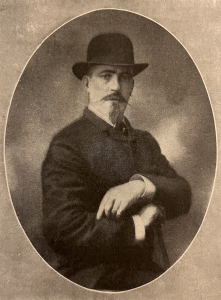Civil War Surprises—Confederate Flashman: The Adventures of Henry R. H. MacIver, Part 4
Editor’s note: This blog post is part of a series. Check out Part 1, Part 2, and Part 3.
‘From Battlefield to Boarding House’
While MacIver gained notoriety from Davis’s publications, he didn’t financially benefit from them. He died in poverty at a boarding house in New York City on May 5, 1907. Police officers discovered he only had 47 cents to his name. MacIver also owed his landlady, Mabel Campbell, rent money.[1]

The night before MacIver’s death, he complained of feeling cold, and Campbell sent him a drink of whiskey and a cup of tea. She became alarmed when he didn’t respond to the knocks on his door the next morning. She forced the door open and found MacIver on his bed half-dressed and appearing to be asleep. She wasn’t able to arouse him, so Campbell called Dr. William F. Varcoe who lived a couple of doors away. Varcoe arrived to MacIver’s bedroom and said that he had been dead for less than two hours. During the autopsy, the coroner’s physician, Timothy D. Lehane, determined MacIver had died of nephritis (inflammation of the kidneys).[2]
MacIver often spoke of his wife, likely Florence, who he claimed was dead (they were divorced), and his daughter, Sybil, who was living in London with her husband. The father and daughter had an estranged relationship, which he supposedly resolved shortly before his death. He had two other children with Florence: a daughter, Magdalene, and a son, Ronald. In addition, he had an illegitimate daughter with the family’s nursemaid, Bertha Sophia Pamplin. MacIver told Campbell that he intended to marry soon and that he was waiting to inherit a small fortune in Scotland.[3]
MacIver’s fiancée, Mary Dillon of Louisville, Kentucky, arrived in New York City to handle his funeral arrangements and rescued his body from being buried in a potter’s field.[4] She claimed that MacIver made a will leaving her a large fortune. However, MacIver amended the will days before his death. He added, “Owing to the peculiar behavior of the said Mary Dillon, she is no longer my betrothed.”[5] Through the intervention of his friends, a camp of Confederate veterans, likely from the Confederate Veteran Camp of New York, provided a military funeral. Dillon and two other women accompanied the hearse to Kensico Cemetery, appropriately located in a hamlet named Valhalla.[6]
In November, Dillon wrote to Richard Harding Davis stating that MacIver had given her a presentation sword. She would relinquish her right to it so it could go to MacIver’s eldest daughter, Magdalene. However, she refused to give to Sybil, and her husband, Edward James Gardner.[7]

“I’d rather you would throw the sword in the sea rather than for you to give it to Mr. Garner who pleaded poverty — why he did not pay me — and I find he is wealthy,” she fumed in a letter to the journalist.[8]
A Pathetic But Fitting End
Henry Ronald Hislop MacIver was undoubtedly flawed and embellished the events of his life, but his energy and capability to connect with influential people and to convince them to follow along with his schemes or to entrust him with responsibility is notable. Even after stripping away the half-truths, MacIver’s life was still remarkable. There’s something romantic about this roving mercenary who served in 18 armies on six continents over two decades, only to end up forgotten and buried in an unmarked grave. But maybe it was an appropriate fate for the enigmatic adventurer.
Richard Harding Davis, the one person who probably best knew MacIver, fittingly declared, “The end was pathetic to a degree, and yet absolutely in keeping with the character of the soldier of fortune, the rolling stone, and of this ‘vagabond gentleman.’”[9]
Shrouded Veterans is raising funds to mark MacIver’s grave with a government-issued veteran headstone. You can donate to the GoFundMe campaign here.
Endnotes
[1] “People Prominently in the Public Eye,” The Sphere: An Illustrated Newspaper for the Home 29, no. 382 (May 18, 1907): 138; “From Battle-Field to Boarding-House,” The Literary Digest 34, no. 20 (May 18, 1907): 812-13; Buck, “Eighteen Flags,” 163; ‘Gen. M’Iver Dead; Hero of Many Wars,” New York Times (New York, NY), May 7, 1907; “MacIver, Escaping 18 Wars, Dies Abed,” The Evening Times (Pawtucket, RI), May 7, 1907.
[2] “Story of Henry R. D. M’Iver Noted Soldier of Fortune,” Augusta Chronicle (Augusta, GA), May 9, 1907; “Many Flags Followed by Major-General Henry Ronald Douglas McIver,” The Manning Times (Manning, SC), May 22, 1907; “M’Iver, Hero of Many Flags, Was Picturesque Character, Rich in Titles,” Aberdeen Daily American (Aberdeen, SD), May 10, 1907.
[3] “Fought the World Around,” The Sun (New York, NY), May 7, 1907; Howard Norton, “A Norton Story . . .” FamilyTreeCircles.com, April 2, 2012, https://www.familytreecircles.com/a-norton-story-47219.html.
[4] “Sweetheart to Bury MacIver,” Wilkes-Barre Times (Wilkes-Barre, PA), May 10, 1907; “MacIver, Escaping 18 Wars, Dies Abed,” The Evening Times (Pawtucket, RI), May 7, 1907.
[5] “General McIver’s Will,” The Daily Picayune (New Orleans, LA), May 11, 1907.
[6] Buck, “Eighteen Flags,” 170; “General MacIver Buried by an Old Sweetheart,” The Washington Times (Washington, D.C.), May 11, 1907.
[7] Mary Dillon to Richard Harding Davis, November 16, 1907, Richard Harding Davis Collection.
[8] Dillon to Davis, May 1, 1908, Richard Harding Davis Collection.
[9] Buck, “Eighteen Flags: The True Story of an Adventurer or Adventures,” 163.
MacIver apparently had temper issues. I knew an officer during my time in Iraq who had survived an IED and had a strange temper. He was generally very amiable, but would over-react to minor comments. With no apparent rhyme or reason to his temper.
Tom
Its Ight
Thanks, Frank, for a story that is little unusual.
Had no idea this relative existed until I was looking for Military history on my own